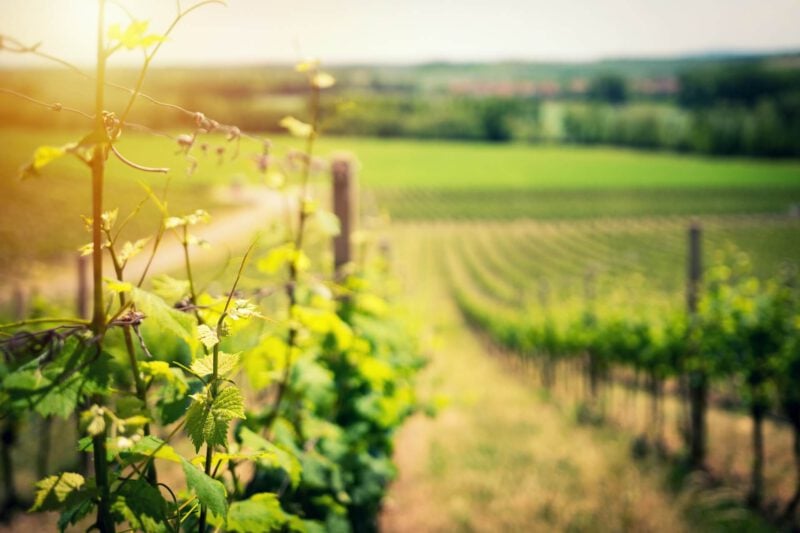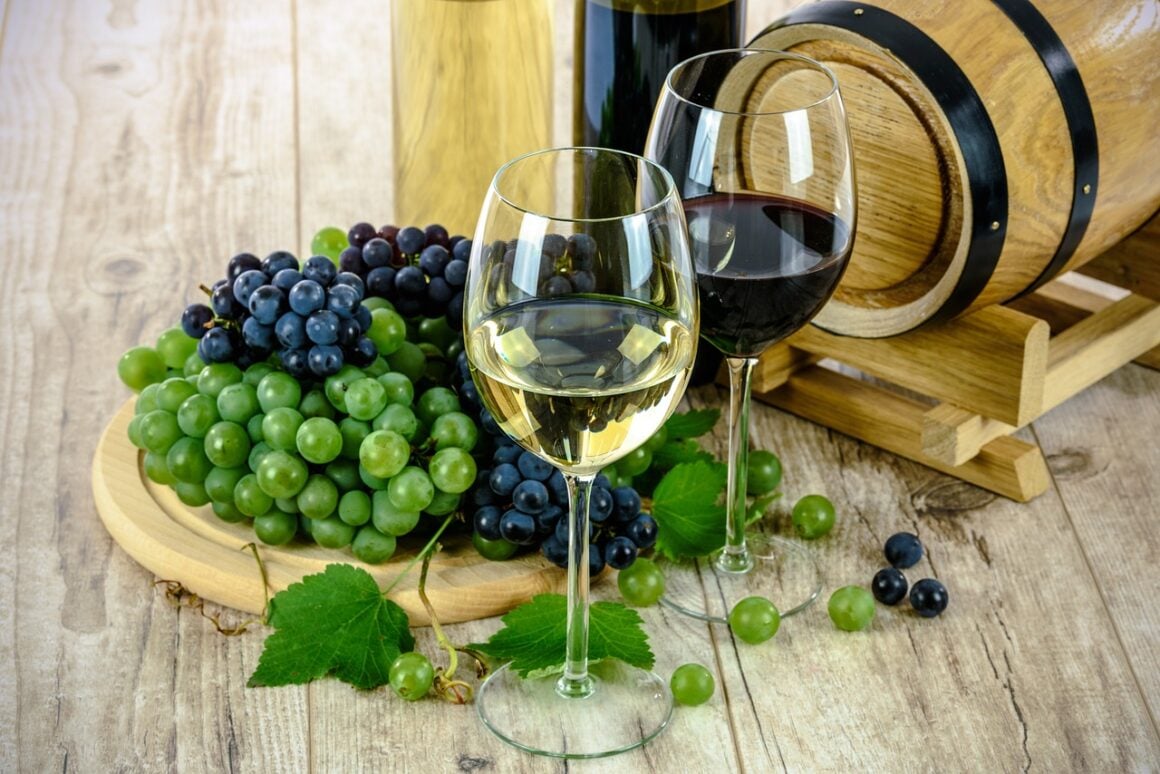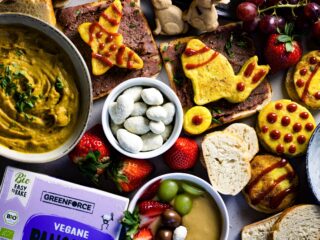Vegan wine – Why not all wine is vegan
- Posted on
- 5 minute read
- Yannick

Summary: Is wine vegan?
Wine in many cases is actually not vegan. This is due to the fact that animal means are used during the manufacturing process. To clarify a wine, winemakers use, for example, gelatin, egg white or the swim bladder of catfish.
Since these clarifying agents serve as technical aids, they are not indicated on the list of ingredients of the wines. Therefore, it is important to pay attention to vegan labels and seals . These guarantee that the wine is free from any animal substances. Instead of animal clarifiers, vegan wine is clarified with mineral clay or vegetable protein . You can find vegan wine in many supermarkets and online.
Meanwhile many winegrowers set on vegan wine sorts and even Promis like Cameron Diaz bring only vegan wines on the market.
We show you what to look for so that you really get the vegan alternative when buying wine.
Wine, sparkling wine and soft drinks are partly not vegan
When most people think of a vegan diet, they think of giving up meat, fish, dairy products, eggs and honey. But what about drinks? More and more beverages contain animal products that we do not recognize at first glance. Wine, sparkling wine and soft drinks may contain animal ingredients without being explicitly advertised. In fact, there are now many vegan wines. But what is it about wine that can’t be vegan? In this article, we’ll get to the bottom of the question and tell you what to look for when searching for vegan wine.
What can't be vegan about wine?
Many people consider drinks such as wine, sparkling wine and Co. automatically vegan, because obviously no animal component is to be recognized . Since wine is made from grapes, no one thinks about possible animal ingredients. Unlike, for example, cocoa, cream liqueurs or eggnog, where milk clearly takes a large share. However, even a fruity wine that appears to be plant-based at first glance may have animal products. However, these are not listed in the ingredient information.
The difference between vegan and non-vegan wine lies in the production. Winemakers use animal clarifiers to remove turbidity from wines. Clarification is the reason vegan:in should be careful when buying wine. Although in principle there are no animal ingredients in the product itself, the wine comes into contact with them during the production process. For most vegans, this is also an absolute no-go.

What is a clarification?
The so-called clarification (also called fining) refers to the process that makes cloudy wine clear. To make the wine look as beautiful as we know it, typically egg white is used for clarification. This binds the proteins contained in the turbidity substances. After successful clarification, the proteins settle to the bottom and the clear wine is drawn off from the top.
Instead of egg white, many traditional wineries clarify with the help of gelatin from pork rinds or from cartilage, bones and tendons of cattle. The isinglass from the dried swim bladder of sturgeon or catfish (fish) is also frequently used. A swim bladder is an air-filled holorgan in the body of the fish. Thanks to this, the fish can adapt to different water depths, among other things. However, wine filtered with the help of the house bubble does not taste like fish
Taste modifying aids
There are also fining agents that change the taste of the wine: If grapes are heavily mechanically stressed during processing or harvesting, tannins (phenols) are produced, which make the red wine taste bitter. Then also reach for protein-based products, to bind off the tannins. A slight vinegar taste also disappears in this way.

Why are animal clarifiers not labeled?
Animal clarifiers are considered merely technical aids and not ingredients. Since they are removed after production, there is no need to declare them on the wine label. Here, then, is the problem: we cannot directly tell whether animal clarifying agents were used in the production process.
How is vegan wine made?
Fortunately, there are now vegan wines that do not require animal clarifying agents. Unlike conventional wine, this uses plant-based agents for clarification and filtration. Mineral clay such as betonite, for example, is a popular plant-based aid. With the help of activated carbon unpleasant odors and tastes, as well as discoloration can be prevented. Vegetable protein from peas, beans and potatoes also clarifies wine.
Will vegan wine remain the exception?
With the view and as wine shelf in the supermarket one realizes fast: The fewest wines are really marked as vegan. But there is hope! Today, more and more winegrowers are abandoning animal-based clarifiers because they are too expensive and the demand for plant-based alternatives is increasing. It can therefore be assumed that animal clarifiers will gradually disappear from wine production and that we can look forward to more vegan wine.
How to recognize vegan wine
Vegan wines are now available in almost every supermarket. Look for a vegan label (The most important vegan logos at a glance) or to a explicit inscription on the back of the bottle. Alternatively, you can email the manufacturers to ask if a wine in their range is vegan. Our Tip: On the website of the wine snob you find over 253 vegan wines from German supermarkets and Discountern.
Champagne vegan - this is how you can tell if your champagne is vegan
If you are looking for a champagne without animal ingredients , there are a few important aspects you should consider. Champagne is usually made from a blend of base wines from different vintages. Animal products such as egg whites or gelatin are often used in the clarification of these wines to remove turbidity. However, if you prefer a vegan champagne, look for varieties made without animal clarifiers. Some champagne producers use alternative methods, such as bentonite, a type of clay mineral, or plant-based products like pea protein.
To make sure your champagne is truly vegan, we recommend looking for labels marked “vegan” when you buy it or for information on the clarification method . This way, you can ensure that your enjoyment of champagne is in line with your vegan lifestyle.
Our tip: Try the “en vie d’éphémère Champagne” – this champagne is guaranteed vegan and also convinces with its exquisite taste. Ideal for special occasions and celebrations.
Did you know?
Wine can also clarify naturally – all by itself. If he can mature a long time(about three to six months, depending on the quality requirement), the wine clarifies all by itself. This Process is called sedimentation. Nowadays, however, demand is so high that winemakers often cannot afford such a long aging period. Therefore, they resort to the artificial clarification with animal or vegetable aids.
Support This Is Vegan - here's how!
On the page you will find affiliate links. If you buy your favorite products through them, we receive a commission, with which you support us.
Alternatively, you can follow us on Instagram, TikTok, YouTube, LinkedIn or Pinterest , listen to our podcast , subscribe to and rate directly here:
Jeder Cent hilft, unsere Vision voranzutreiben.
🙏🏽💚
Yannick
Nächster Artikel
Yes, You Can Build Muscle on a Vegan Diet
- Posted on
- Trinity Sparke
What is beta-alanine? All about effect & dosage
- Posted on
- Christin Uthoff
Rice protein – facts about the underestimated vegan protein source
- Posted on
- Christin Uthoff
Vegan sports nutrition – How a good protein supply succeeds
- Posted on
- Christin Uthoff
Is maltodextrin vegan? All about effect & origin
- Posted on
- Christin Uthoff
From burnout to successful food blogger – Stina Spiegelberg on plant-based culinary arts
- Posted on
- Yannick
Easter vegan: everything for an animal-friendly Easter brunch
- Posted on
- Anna Sebestova
Can I eat this? – Animal ingredients are hidden behind these ingredients
- Posted on
- Julia Kein










